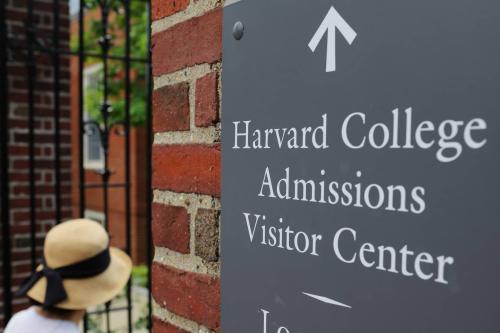Russ Whitehurst joined Politico’s Jonathan Martin and CBS News’ Bob Schieffer on Washington Unplugged to talk about the politics behind President Obama’s education policy
Bob Schieffer, CBS News: So President Obama made a big speech on education this week and here to talk about it is Russ Whitehurst, who is the chief of education policy at Brookings. Before that, he was at the Department of Education and Jonathan Martin of Politico.
Russ, first, controversial speech really when you stop and think about what the President said. He came out for all things, merit pay, which a lot of people were for but most of the teachers union were against.
Russ Whitehurst: That’s right, I think the National Education Association must have lost a little sleep over that speech. So the response has been muted so far. He also strongly endorsed charter schools which are radical in a way as well. So, he hit a lot of issues that I think are interesting and important, certainly good to have a President using the bully pulpit to advance education if you are interested in education reform.
Schieffer: What can the President really do because most education is at the local level, it’s funded by local taxes and so forth.
Whitehurst: President and the Secretary of Education have a tremendous amount of money to dole out under the stimulus bill and portions of that are at the Secretary of Education’s discretion. So he can use that lever to move education forward if he wishes to.
Schieffer: Jonathan, what about the politics of all of this?
Jonathan Martin: Well, I was really struck by some of his rhetoric Bob. The fact is that this a Democratic President up there giving his first education speech and talking about not standing for failing teachers being in schools. The teacher’s unions provide key foot soldiers and money to Democratic candidates up and down the ballot. I think in 2004, one out of every ten delegates to the Democratic convention was a member of a teacher’s union. So it was striking, but there was some good groundwork laid out by the White House. My reporter turned up at the AFT and NEA had both gotten phone calls from the White House in advance, giving them a heads up as to hey, this was coming, this is what he’s going to say. So they kind of knew that this was going to happen. But his language was far more confrontational on the issue than it was during the course of the campaign, where he was always a little more muted as far as talking about teachers.
Schieffer: Where you surprised Russ?
Whitehurst: I was surprised particularly by the rhetoric. You may remember that he was booed at the NEA convention when he mentioned merit pay. And yet there was really no equivocation on that issue in his speech this week.
Schieffer: Why would teachers be against merit pay?
Whitehurst: Well, it’s an interesting question because in the rest of the world, merit pay is part of the way people do their work and get compensated. I think the system is ripe for change and I think younger teachers are interested in merit pay. I think the whole compensation system has to be changed if we want to have the best and brightest come in teaching.



Commentary
Obama’s Education Policy
March 13, 2009